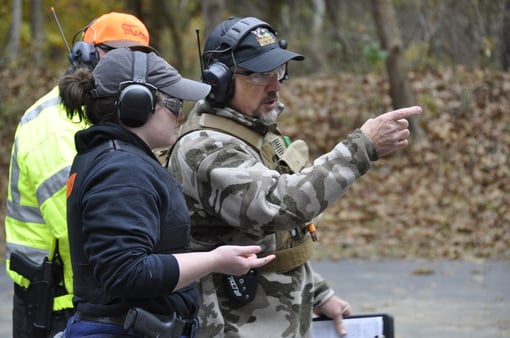Natural Resources Law Enforcement Program Description
 The Natural Resources Law Enforcement program prepares you for emergency service and visitor assistance careers in the natural resources field.
The Natural Resources Law Enforcement program prepares you for emergency service and visitor assistance careers in the natural resources field.
The program is designed to teach the skills necessary to protect life and resources from harm in federal, state, local, and privately-held parklands, natural areas, recreational sites, and managed resource areas. Rangers frequently engage in law enforcement, search and rescue, emergency medicine, fire fighting, visitor and user assistance, resource management and education.
Hocking College offers all-inclusive pricing and works with students to assure they have complete college funding, including financial aid, before they start classes. Please reference the course curriculum tab for program costs.
All-inclusive pricing includes the following:
PER SEMESTER
$300......Learning Fee
$20........Health Center Services
$75........Career Center Services
Not included in the All-Inclusive Pricing
$53......Parking
Pricing for housing and meal plans can be found here.
A Career in Natural Resources Law
Enforcement Will Take You Back to Your Roots
Graduates of the Natural Resources Law Enforcement Program are eligible for employment as park rangers at private, local, county, state and federal levels.
Examples of job titles may include, Park Police Officer, Law Enforcement Officer, Environmental Police Officer, Wildlife Officer, Watercraft Officer, or Conservation Officer.
Student Learning Outcomes (SLOs) are statements of what a student will be able to do when they have completed a program. They represent the knowledge and skills a program has determined are most important for students to gain from that program and include both the Success Skills (institutional outcomes) and Program Outcomes. SLOs are specific and measurable so the program can accurately assess the degree to which students have achieved each outcome, and they align with college and institution mission and values. Data on the achievement of SLOs is used to make improvements in the program and increase student success.
Hocking College Institutional Learning Outcomes
1) Demonstrate sound critical thinking, information literacy and technological competency in the production of academic writing and presentations
2) Apply the methods of mathematical, statistical or analytical reasoning to critically evaluate data, solve problems and effectively communicate findings.
3) Demonstrate an awareness of the social, political and economic forces which shape individuals, institutions and communities in the modern world.
4)Understand social justice and the diversities and complexities of the cultural and social world past and present and come to an informed sense of self and others.
5)Demonstrate a foundation of knowledge in the natural sciences based on theory and laboratory skills.
6) Cultivate ethical values, personal wellness and personal learning strategies in the development of the whole person, mind, body and spirit.
7) Integrate content material to application in the workforce and apply discipline specific knowledge and skills to successfully transfer or effectively meet the expectations of internships, workplace, volunteerism and/or entrepreneurship endeavors.
8) Utilize the ethical and professional application of current information technology and tools effectively.
Program Outcomes
The following outcomes are skills, behaviors, and attitudes cultivated in students seeking the Associate of Applied Science in Natural Resources Law Enforcement program:
- Recognize and practice a professional, personal, and ethical lifestyle consistent with law enforcement standards
- Appropriately utilize knowledge of the state and federal laws of arrest, search and seizure.
- Apply basic investigation and evidence processing skills.
- Maintain personal health and wellbeing that meets or exceeds fitness standards at local, state and federal agencies.
- Demonstrates proficiency as a multifaceted natural resources ranger in both law and interpretation.
- Applies administrative, leadership, and management skills in the natural resources profession.
Retention Rates
- All registered fall/autumn students with registration status for the following fall/autumn.
- Excludes special populations - College Credit Plus, Non Degree, Online Military and University Center.
Potential for upcoming fall/autumn excludes graduates from that fall/autumn, spring and summer terms.
| Academic Year | Retention Rate |
| 2016 - 2017 | 61% |
| 2015 - 2016 | 59% |
| 2014 - 2015 | 58% |
Graduation Rates
Graduation rates are determined by the office of Institutional Research. To ensure appropriate time for data collection, this report will be run and posted annually in the last week of September for the previous academic year. It should be noted that annual graduation rates may change as students continue to graduate. The following criteria will be utilized for the calculation of graduation rates:
- Overall Program Completion Rate is defined as a percentage of the ratio:
All graduates of the program
_________________________________________________________________
All students with the program in their history of programs of study - For the purposes of reporting, the program completion rates are aggregated by academic year of entry.
- A student is considered to have completed or graduated from a program or certificate by virtue of having been awarded the degree or certificate.
- A student is considered to be undertaking activity in a program of study for the duration of time that they are in an active status in a program or certificate. This is defined by having a Program of Study with a status of ‘A’ during the duration of time they are taking coursework. Should a student move in and out of active status in a program of study while continuing to take coursework, we only take into account the student’s activity while the program has an active status for that particular program of study.
| Academic Year | Graduation Rate |
| 2016 - 2017 | 24.82% |
| 2015 - 2016 | 31.39% |
| 2014 - 2015 | 23.18% |
Can I start this program out of sequence?
Yes, you may start at the beginning of every semester because there are no prerequisites in the program.
How long is the Ohio Peace Officer Basic Training?
The academy is 18 weeks or a semester and a couple of weeks and it is offered here at Hocking College twice a year.
What are the job positions in the field after I graduate from this program?
Wildlife Officer, Park Officer, Natural Resource Officer, Watercraft Officer, Conservation Officer, Forest and Preserve Officer, Park Ranger. And any other traditional Law Enforcement Officer.
What is the Introduction to Natural Resources Law Enforcement class?
The Introduction to Natural Resources Law Enforcement Class is a four-day trip around the state of Ohio where students visit Wildlife Areas, State Parks, County Parks, Metro Parks, National Parks and speak with officers from each agency in order to gain information on a career track.
This class is designed to help students determine if Natural Resources Law Enforcement is the right career path for them.






